Abū Naṣr Muḥammad ibn Muḥammad al Fārābī, known in the West as Alpharabius (born in 870 (or 872); died in 950 (or 951)), was a renowned philosopher and jurist who wrote in the fields of political philosophy, metaphysics, ethics and logic. He was also a scientist, cosmologist, mathematician and music scholar.
In Islamic philosophical tradition he was often called "the Second Teacher", following Aristotle who was known as "the First Teacher". He is credited with preserving the original Greek texts during the Middle Ages because of his commentaries and treatises, and influencing many prominent philosophers, like Avicenna and Maimonides. Through his works, he became well-known in the West as well as the East.
The main-belt asteroid 7057 Al-Fārābī was named in his honour.
Biography
The existing variations in the basic accounts of al-Farabi's origins and pedigree indicate that they were not recorded during his lifetime or soon thereafter by anyone with concrete information, but were based on hearsay or guesses (as is the case with other contemporaries of al-Farabi). Little is known about his life. Early sources include an autobiographical passage where al-Farabi traces the history of logic and philosophy up to his time, and brief mentions by Al-Masudi, Ibn al-Nadim and Ibn Hawqal. Said Al-Andalusi wrote a biography of al-Farabi. Arabic biographers of the 12th–13th centuries thus had few facts to hand and used invented stories about his life.
From incidental accounts it is known that he spent significant time (most of his life) in Baghdad with Christian scholars including the cleric Yuhanna ibn Haylan, Yahya ibn Adi, and Abu Ishaq Ibrahim al-Baghdadi. He later spent time in Damascus and in Egypt before returning to Damascus where he died in 950-1.
His name was Abū Naṣr Muḥammad b. Muḥammad Farabi, sometimes with the family surname al-Ṭarḵānī, i.e., the element Ṭarḵān appears in a nisba. His grandfather was not known among his contemporaries, but a name, Awzalaḡ, suddenly appears later in the writings of Ibn Abī Uṣaibiʿa, and of his great-grandfather in those of Ibn Khallikan.
His birthplace could have been any one of the many places in Central Asia-Khurasan that is known by that name. The name "parab/farab" is a Persian term for a locale that is irrigated by effluent springs or flows from a nearby river. Thus, there are many places that carry the name (or various evolutions of that hydrological/geological toponym) in that general area, such as Fārāb on the Jaxartes (Syr Darya) in modern Kazakhstan, Fārāb (modern Türkmenabat) on the Oxus Amu Darya in Turkmenistan, or even Fāryāb in Greater Khorasan (modern day Afghanistan). The older Persian Pārāb (in Ḥudūd al-ʿĀlam) or Fāryāb (also Pāryāb), is a common Persian toponym meaning "lands irrigated by diversion of river water". By the 13th century, Fārāb on the Jaxartes was known as Otrār.
Scholars largely agree that Farabi's ethnic background is not knowable.
Iranian origin theory
Medieval Arab historian Ibn Abī Uṣaibiʿa (died in 1270) – al-Farabi's oldest biographer – mentions in that al-Farabi's father was of Persian descent. Al-Shahrazūrī who lived around 1288 A.D. and has written an early biography also states that Farabi hailed from a Persian family. According to Majid Fakhry, an Emeritus Professor of Philosophy at Georgetown University, Farabi's father "was an army captain of Persian extraction." Dimitri Gutas, professor of Arabic and Islamic Studies in the Department of Near Eastern Languages and Civilizations at Yale University, notes that Farabi's works contain references and glosses in Persian, Sogdian, and even Greek, but not Turkish. Sogdian has also been suggested as his native language and the language of the inhabitants of Fārāb. Muhammad Javad Mashkoor argues for an Iranian-speaking Central Asian origin. A Persian origin has been stated by many other sources as well.
Turkic origin theory
The oldest known reference to a Turkic origin is given by the medieval historian Ibn Khallikān (died in 1282), who in his work Wafayāt states that Farabi was born in the small village of Wasij near Fārāb (in what is today Otrar, Kazakhstan) of Turkic parents. Based on this account, some modern scholars say he is of Turkic origin.
Dimitri Gutas, an American Arabist of Greek origin, criticises this, saying that Ibn Khallikān's account is aimed at the earlier historical accounts by Ibn Abī Uṣaibiʿa, and serves the purpose to "prove" a Turkic origin for al-Farabi, for instance by mentioning the additional nisba (surname) "al-Turk" (arab. "the Turk") – a nisba Farabi never had. However, Abu al-Fedā', who copied Ibn Ḵhallekān, corrected this and changed al-Torkī to the phrase "wa-kāna rajolan torkīyan", meaning "he was a Turkish man." In this regard, Oxford professor C.E. Bosworth notes that "great figures [such] as al-Farabi, al-Biruni, and ibn Sina have been attached by over enthusiastic Turkish scholars to their race".
Life and education
Al-Farabi spent almost his entire life in Baghdad. In his auto-biographical passage, Farabi stated that he had studied logic, medicine and sociology up to and including Aristotle's Posterior Analytics. His teacher, bin Ḥaylān, was a Nestorian cleric. He was in Baghdad at least until the end of September 942. He finished the book in Damascus the following year, by September 943. He also studied in Tétouan, Morocco and lived and taught for some time in Aleppo. Farabi later visited Egypt, finishing six sections summarising the book Mabādeʾ in Egypt in July 948 – June 949 when he returned to Syria, where he was supported by Sayf al-Dawla, the Hamdanid ruler. Al-Masudi, writing barely five years after the fact, says that Farabi died in Damascus in Rajab 339 (between 14 December 950 and 12 January 951).
Works and contributions
Farabi made contributions to the fields of logic, mathematics, music, philosophy, psychology, and education.
Alchemy
Al-Farabi wrote The Necessity of the Art of the Elixir
Logic
Though he was mainly an Aristotelian logician, he included a number of non-Aristotelian elements in his works. He discussed the topics of future contingents, the number and relation of the categories, the relation between logic and grammar, and non-Aristotelian forms of inference. He is also credited with categorising logic into two separate groups, the first being "idea" and the second being "proof".
Al-Farabi also considered the theories of conditional syllogisms and analogical inference, which were part of the Stoic tradition of logic rather than the Aristotelian. Another addition al-Farabi made to the Aristotelian tradition was his introduction of the concept of poetic syllogism in a commentary on Aristotle's Poetics.
Music
Al-Farabi wrote a book on music titled Kitab al-Musiqa (The Book of Music). In it, he presents philosophical principles about music, its cosmic qualities, and its influences.
He also wrote a treatise on the Meanings of the Intellect, which dealt with music therapy and discussed the therapeutic effects of music on the soul.
Philosophy
As a philosopher, Al-Farabi was a founder of his own school of early Islamic philosophy known as "Farabism" or "Alfarabism", though it was later overshadowed by Avicennism. Al-Farabi's school of philosophy "breaks with the philosophy of Plato and Aristotle [... and ...] moves from metaphysics to methodology, a move that anticipates modernity", and "at the level of philosophy, Alfarabi unites theory and practice [... and] in the sphere of the political he liberates practice from theory". His Neoplatonic theology is also more than just metaphysics as rhetoric. In his attempt to think through the nature of a First Cause, Alfarabi discovers the limits of human knowledge".
Al-Farabi had great influence on science and philosophy for several centuries, and was widely considered second only to Aristotle in knowledge (alluded to by his title of "the Second Teacher") in his time. His work, aimed at synthesis of philosophy and Sufism, paved the way for the work of Ibn Sina (Avicenna).
Al-Farabi also wrote a commentary on Aristotle's work, and one of his most notable works is Al-Madina al-Fadila (The Virtuous City) where he theorised an ideal state as in Plato's The Republic. Al-Farabi argued that religion rendered truth through symbols and persuasion, and, like Plato, saw it as the duty of the philosopher to provide guidance to the state. Al-Farabi incorporated the Platonic view, drawing a parallel from within the Islamic context, in that he regarded the ideal state to be ruled by the prophet-imam, instead of the philosopher-king envisaged by Plato. Al-Farabi argued that the ideal state was the city-state of Medina when it was governed by the prophet Muhammad as its head of state, as he was in direct communion with Allah whose law was revealed to him.
Physics
Al-Farabi wrote a short treatise "On Vacuum", where he thought about the nature of the existence of void. He also may have carried out the first experiments concerning the existence of vacuum, in which he investigated handheld plungers in water. His final conclusion was that air's volume can expand to fill available space, and he suggested that the concept of perfect vacuum was incoherent.
Psychology
He wrote Social Psychology and Principles of the Opinions of the Citizens of the Virtuous City, which were the first treatises to deal with social psychology. He stated that "an isolated individual could not achieve all the perfections by himself, without the aid of other individuals," and that it is the "innate disposition of every man to join another human being or other men in the labour he ought to perform." He concluded that to "achieve what he can of that perfection, every man needs to stay in the neighbourhood of others and associate with them."
In his treatise On the Cause of Dreams, which appeared as chapter 24 of his Principles of the Opinions of the Citizens of the Virtuous City, he distinguished between dream interpretation and the nature and causes of dreams.
"Шетелде неке қиюды (ерлі-зайыпты болуды) мемлекеттік тіркеу" мемлекеттік қызметін алу үшін келесі құжаттарды ұсына отырып, Елшіліктің консулдық бөліміне жеке жүгіну керек:
Abai Kunanbaiuly was born August 10, 1845 in Chingiz Mountains Semipalatinsk region (under the current administrative division) from one of the four wives Kunanbai, senior Sultan Karkarala district.
Abai’s family was aristocratic, his grandfather (Oskenbay) and grand grandfather (Yrgyzbay) dominated in their tribes as governors and biys (judges)
Ibrahim was lucky in the sense of coziness and family education, as his mother Ulzhan and grandmother Zere were extremely gifted and charming natures. Due to his attentiveness and thoughtfulness, which differentiated him from other children, his mother called him “Abai”.
Homeschooling and introduction to the folklore, which were started in early childhood, was continued at madrassas of Imam Ahmad Riza. At the same time Abai studied at Russian school and by the end of the five-year study began to write poetry.
Hegel wrote that philosophy is an epoch grasped in thought. However, to grasp in thought the era, it must be a thinker in the highest sense of the word. Abai Kunanbaiuly was among one of these thinkers in the second half of 19th century in Kazakhstan.
In this case, under thinker we do not mean someone who works as a monk locked in a narrow cell, delving into ancient manuscripts and trying to fish out some important laws of social development. Despite that Abai belonged to the elite of Kazakh society, he never fenced himself from the disaster and needs ofordinary people. On the contrary, as a philosopher, he lived with what his people lived, shared with them their pain and deprivation. Joys were little, but how he could live and enjoy himself? Abai’s feat, in fact his whole life was a real feat and only about the interest of his people, their pain reflected on his big heart, the heart of philosopher and person.
Wealth and cattle did not concern him. As a thinker and patriot of his homeland, his heart was crying blood, as he knew all the needs and hopes of his people in order to be satisfied with surroundings.
Communication with exiled Russian social democrats, E.P.Mihoelisom, N.Dolgopolovym and S.Grossom, gave impetus to his potential abilities. Abai’s treatment of Russian literature, which experienced creativeimpulse at that time, was natural, where poetic in Eastern tradition was treated very high.
Morality and languages take paramount part at Abai’s universal system. He considered that language opens a window into the vast world. Humanity and liberality oblige learn languages of other nations, as only in this way for human-thinker can feel a connection with the geniuses of the spiritual world.
There are dozens of definitions of man. Certainly, the most acceptable usually relies on scientific: representative of the genus homosapiens. However, is it always that every man justifies such a flattering definition? It is says, that, person is that and that, but sometimes it represented that every definition is not accurate, as some people born to manage and others to obey. They are majority, but Abai as peak of mountain rises high above drab existence of reality of his time.
Abai did not become a follower of German philosophers, despite that he learned their works, for instance, Feurbach’s anthropological materialism. On the contrast, he considered the anatomical structure of the human bodies and its organs not as a product of nature, but as a result of the creative activity of God, his wisdom and love to humans. On the other hand, such worldview position did not prevent him to represent a man as unique and high product of his philosophy.
Abai absorbed much of that carried the eastern and Arab culture: the Quran, the thousand and one nights. He was familiar with the works of Ferdowsi, Nizami, Saadi and Navoi, studied the works of Aristotle, Socrates, Spinoza and Spencer.
Poetry of Pushkin, Lermontov, Goethe, Byron and Schiller was extremely congenial to him. As well as he wanted to be introduce his people with top of the world spirit. In his translation into Kazakh languages Abai subtly conveyed the spirit of poems and adapted them into the outlook of his fellow tribesmen.
Within 20 years Abai bloomed as versatile genius. He won extraordinary authority and popularity which were unknown in steppe before. He was surrounded by Akyns (oral improvising poets), singers, composers and young talented people, socio-philosophical and literary schools being established.
Abai’s moral and ethical views were not just a figment of his imagination over the observation of life and social system of Kazakhs. Abai thoroughly studied the works of ancient philosophers such as Plato and Aristotle, as well as works of German philosophers of modern times like Kant, Hegel and Feuerbach.
Ethical and aesthetic problems, despite their importance could not be resolved without reference to the decision of the more common questions of philosophy. One of such issue was the question of a common basis of existence and cognition, God and man.
Wise Abai used to love to repeat the words of the Prophet Muhammad: “A good man is one that benefits the people” [“Gakliya” - “Words of edification”, the thirty-eighth word] these words can be applied to him but not anyone else.
The essay “Gakliya”(“Words of edification”) or “Kara soz” (“Book of words”), take a special place in the Abai’s art. Under these name combined forty five “Words” - small, carefully crafted, artistic, stylistic completed fragments. The term “penalty” (Black) in combination with the term “Soz” (“The Word”) is extremely polysemous. This symbolize sadness, prose, unlike rhymed speech and text. As well as it means something significant, important and paramount in the Turkic tradition.
“Book of words” it is also direct appeal to the readers, like conversation and open talk, unique work “of observation of the cold mind and sorrowful heart markings” and philosophy of life of individual on the background of destiny.
“Book of words” by genre similar to what in Genghis Khan’s tradition called “Bilik” –is a precise expression, a story about life example, having the shape of the sample.
The name “Book of words” or “Words of edification” of Abai, inaccurately transfers the meaning of the philosopher. In European tradition, “Book of words” belongs to the genre of aphorisms and maxims. In fact, it is confession – extremely deep and responsible genre, which requires integrity and sincerity from the writer, in other way, we are facing with “nakedness of soul” of man, poet and philosopher.
Forty five “Words of edification” is the philosophical reflection of the poet about life problems and deeply sad “face to face” conversation with his audience. Addressing to them, the poet ask himself: maybe “Should I rule the people?”, “Should I multiply knowledge?”, “Should I do religious rites? or “Should I educate the children?”.
Finally, in this way Abai explains his decision to write down “own thoughts”: “Paper and ink from now on will be my consolation…Maybe someone will like some of my word and he will rewrite it for himself or just remember. If not, then my words, as it says, will stay with me [First word].
Many lines from the “Book of words” became immortal: “Man born crying and grieves when he leaves” [Fourth word]; “Man becomes intellectual, remembering the words of the wises” [Nineteenth word]; “He who seeks praise from loved ones, I am sure he will achieve it, praising and lifting up himself to heaven”[Twenty first word]; “Scientist and philosopher are the pride of humanity. They are those who have more senses and mind. We do not invent science, it appears as a result of our feelings, observation and thoughts about the creation around us and organized world for us” [Word forty third].
On the behalf of Socrates Abai in the “Book of words” said about what he thought thoroughly before, disputing with Aristotle, the philosopher says: “Certainly, you will agree, that the top creation of the creator is a man. However, does not the creator give him five senses, being confident in their necessities for man? Do you find that a man has random organs?
For example, we have eyes to see. If they were not existed, could we enjoy the beauty of the world? Eyes are gentle and there are eyelids to keep them. They open and close when it necessary from a wind and mote, whereas eyebrows withdraw sweats trickling down from forehead.
If ears were not existed, people would not be able to hear noise, rattling, would not be able to guard against rustling or cry and would not have enjoyed the sounds of songs or tunes.
If a nose does not smell, people would not able stretch incense and turn away from stench. He would not care.
Finally, if a person would not have palate and tongue, he would be able to recognize sweetness or bitterness of food.
Is that all bad for human?
Eyes and nose are located not far from mouth to man to see purity and could smell a food. However, other necessary to person holes, which spew out waste from body and located away from the head. “Could it be possible to say that it’s all random manifestation of the mind of the creator?”
If only in science everything was so clear, so that to know with confidence in which direction to go and what to do. When we are in trouble, we can always rely on a help of wise, we just need to turn to him: “Once power, mind and heart argued, who among them is necessary to person. After they found out that cannot reach the agreement, they turned to Science for help. As I said, get together let heart guide you! If this happens and all of you gather in one person, so he will become righteous. Dust from the soles of his feet will heal the blinds. Harmony and purity of life is the main meaning of the great world. If you won’t be able to unite, then I will give preference to the heart – the king of human life, thus Science resolve the dispute”.
“Words of edification” is like conclusion and result of life. “Lived I good life up until now, but when we can already see the end of the path, when the soul exhausted and tired. I am convinced that my good intentions being ineffective in the vanity and frailty of human life.
“I am truly dead, despite that I am exist. I cannot understand the reason: whether weak disappointment to relatives, whether in the rejection of himself or something else. In appearance I am quite healthy, as dead inside. Even if laugh I do not feel joy. No matter what I tell you, if I laugh - all this as not mine, but someone else”.
“I do not understand how do I treat my nation: do I dislike or love them? – If I loved them, without any doubt I would agree its morals and among other characters found out even one to be proud of. My love would not allow the faith to go out, as if my people have such qualities inherent of great people. However, I do not have that faith”, – draws a line Abai.
Nine years passed before Abai wrote forty-five “Words-talks”, and expressed in them innermost thoughts, aspirations, mournful complaints indifferent to the poet’s voice contemporaries. “Life is lived – I argued, fought, judged, having only troubles and exhausted on them, tired and convinced in aimlessness of everything done”.
I shouted from the cliff,
Space answered me
But when he heard the sound
I was looking around:
How, where this sound come from?
Was the same rock or different,
There is response, but the response is empty.
I have a great,
Wide kin,
No reason to be alone,
Great family, but I was not understood
And I live alone among,
As the tomb of the shaman,
I am alone - that’s my truth!
A careful and thoughtful reading and studying of “Words” will be a tribute to the great and wise Abai, whom can be referred lines, once written by him:
Can be called the one,
Who gave to the world immortal words.
Abai Kunanbaiuly is the great poet, writer, public figure, founder of modern Kazakh literature, reformer of culture in the spirit of rapprochement with Russian and European culture on the basis of enlightened Islam.
Electronic Visas
An electronic visa (business, tourist and medical) is issued on the basis of a valid invitation from the Kazakhstan side, issued in accordance with the established procedure in the migration service units of the Ministry of Internal Affairs of the Republic of Kazakhstan.
Foreigners can enter/leave on/off the territory of the Republic of Kazakhstan using a valid electronic visa only through the checkpoints of international airports of the Republic of Kazakhstan.
Electronic visas are issued to citizens of 109 countries (a list of countries is attached).
The electronic visa is valid only for the recipient of the visa and does not apply to accompanying persons.
The consular fees paid are non-refundable.
The passport provided by the visa recipient must meet the following criteria:
1) do not raise doubts about its authenticity and belonging to its owner, contain notes on extension, reservations, entries, erasures and corrections, torn or embossed pages;
2) have at least 2 clean pages;
3) its validity period expires not earlier than 3 months from the date of expiry of the requested visa;
4) must not have any notes on the extension of the validity period.
Receiving party informs the Migration Service about foreign nationals staying with them within three working days of their arrival.
Step-by-step algorithm for issuing an electronic visa
- To obtain an electronic visa, you must register on the Visa and Migration Portal website (www.vmp.gov.kz);
- after registration, familiarise yourself with the requirements for obtaining an electronic visa;
- enter the number of invitation (the number of invitation is sent by the inviting party in the Republic of Kazakhstan) and fill in the necessary passport data;
- to pay the consular fee;
- print out the electronic visa (visa is formed in the personal office);
- to present a printed electronic visa when passing passport control at the international airports of Astana and Almaty.
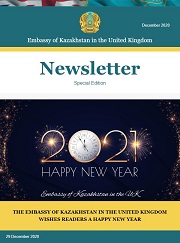
Жаңалықтар бюллетені, №182, 2020. Арнайы шығарылым
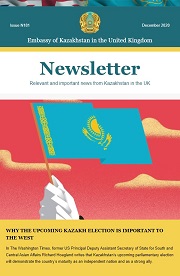
Жаңалықтар бюллетені, №181, 2020
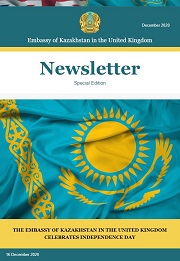
Жаңалықтар бюллетені, №180, 2020. Арнайы шығарылым
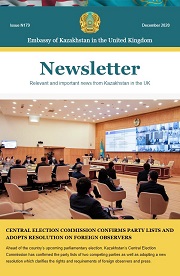
Жаңалықтар бюллетені, №179, 2020
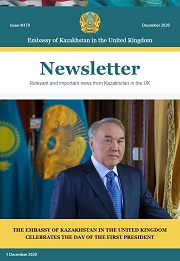
Жаңалықтар бюллетені, №178, 2020
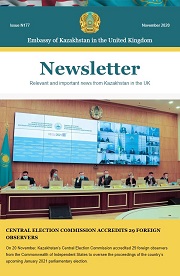
Жаңалықтар бюллетені, №177, 2020
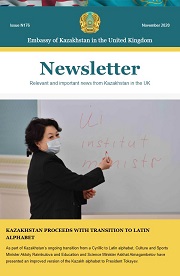
Жаңалықтар бюллетені, №176, 2020
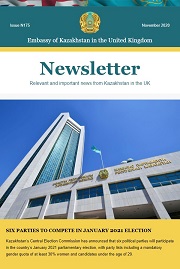
Жаңалықтар бюллетені, №175, 2020
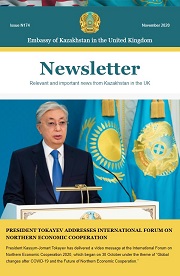
Жаңалықтар бюллетені, №174, 2020
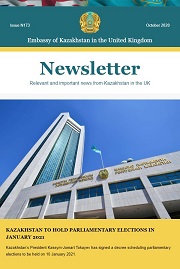
Жаңалықтар бюллетені, №173, 2020
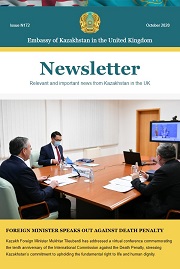
Жаңалықтар бюллетені, №172, 2020
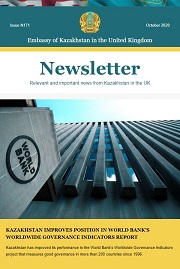
Жаңалықтар бюллетені, №171, 2020
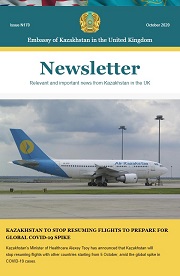
Жаңалықтар бюллетені, №170, 2020
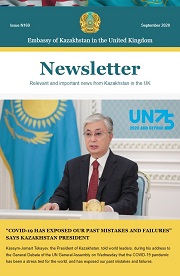
Жаңалықтар бюллетені, №169, 2020
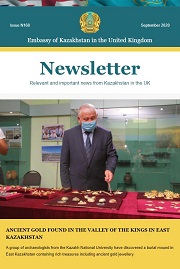
Жаңалықтар бюллетені, №168, 2020
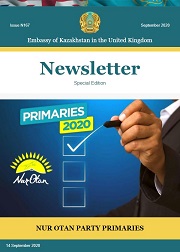
Жаңалықтар бюллетені, №167, 2020. Арнайы шығарылым
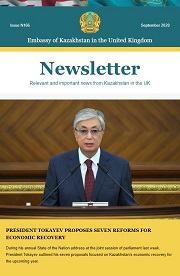
Жаңалықтар бюллетені, №166, 2020
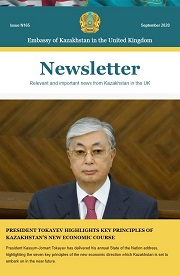
Жаңалықтар бюллетені, №165, 2020
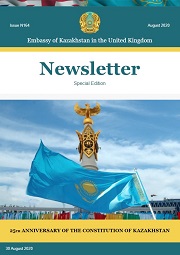
Жаңалықтар бюллетені, №164, 2020. Арнайы шығарылым
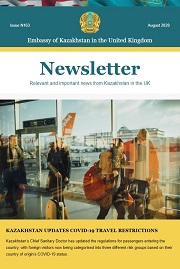
Жаңалықтар бюллетені, №163, 2020
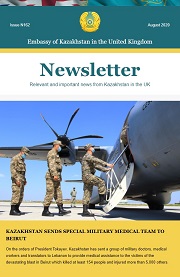
Жаңалықтар бюллетені, №162, 2020
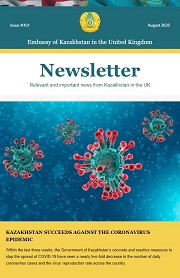
Жаңалықтар бюллетені, №161, 2020
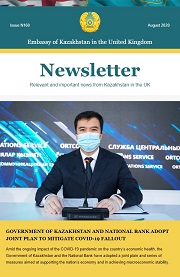
Жаңалықтар бюллетені, №160, 2020
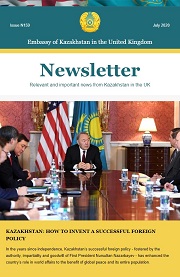
Жаңалықтар бюллетені, №159, 2020
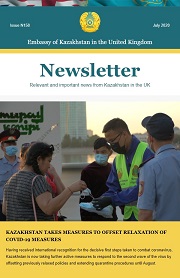
Жаңалықтар бюллетені, №158, 2020
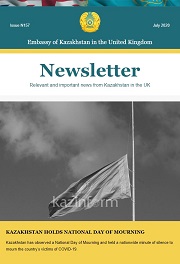
Жаңалықтар бюллетені, №157, 2020
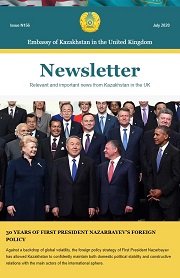
Жаңалықтар бюллетені, №156, 2020
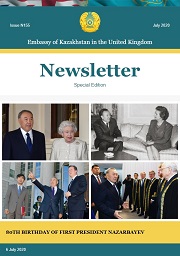
Жаңалықтар бюллетені, №155, 2020. Арнайы шығарылым
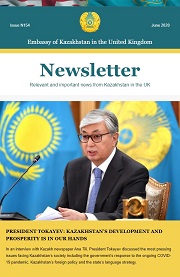
Жаңалықтар бюллетені, №154, 2020
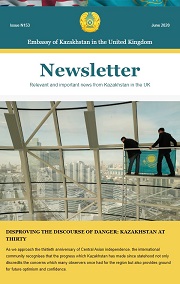
Жаңалықтар бюллетені, №153, 2020
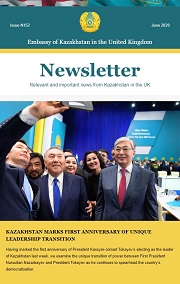
Жаңалықтар бюллетені, №152, 2020
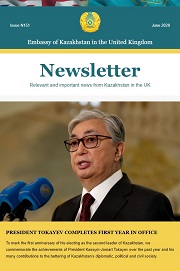
Жаңалықтар бюллетені, №151, 2020
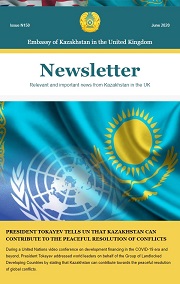
Жаңалықтар бюллетені, №150, 2020
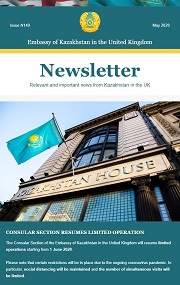
Жаңалықтар бюллетені, №149, 2020
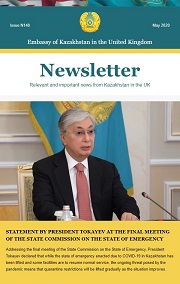
Жаңалықтар бюллетені, №148, 2020
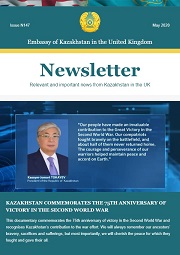
Жаңалықтар бюллетені, №147, 2020
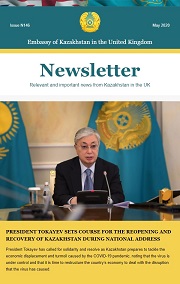
Жаңалықтар бюллетені, №146, 2020
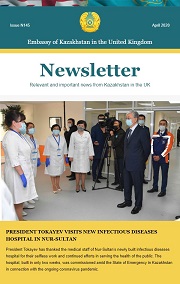
Жаңалықтар бюллетені, №145, 2020
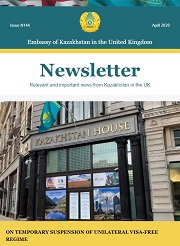
Жаңалықтар бюллетені, №144, 2020
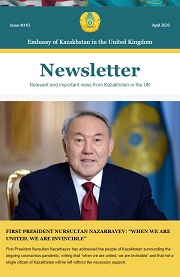
Жаңалықтар бюллетені, №143, 2020
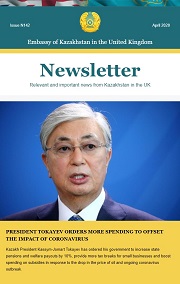
Жаңалықтар бюллетені, №142, 2020
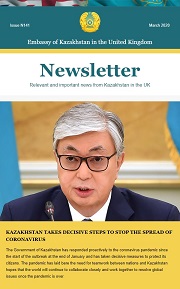
Жаңалықтар бюллетені, №141, 2020
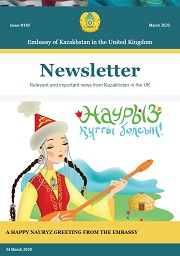
Жаңалықтар бюллетені, №140, 2020
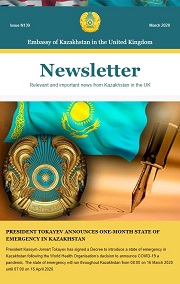
Жаңалықтар бюллетені, №139, 2020
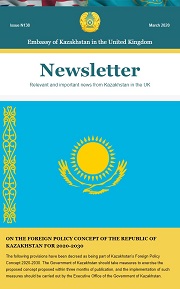
Жаңалықтар бюллетені, №138, 2020
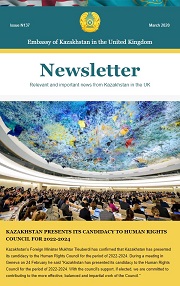
Жаңалықтар бюллетені, №137, 2020
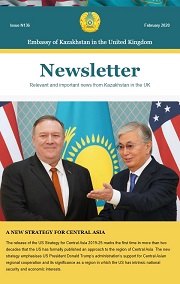
Жаңалықтар бюллетені, №136, 2020
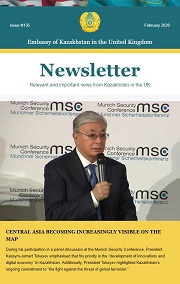
Жаңалықтар бюллетені, №135, 2020
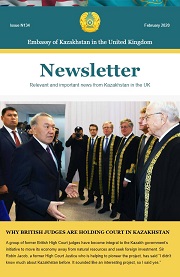
Жаңалықтар бюллетені, №134, 2020
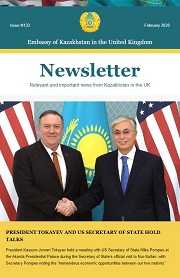
Жаңалықтар бюллетені, №133, 2020
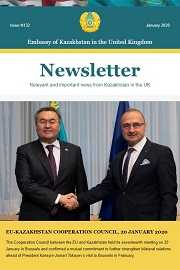
Жаңалықтар бюллетені, №132, 2020
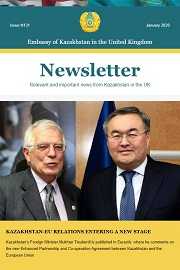
Жаңалықтар бюллетені, №131, 2020
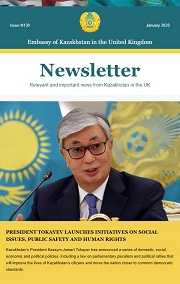
Жаңалықтар бюллетені, №130, 2020
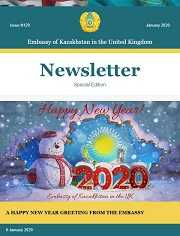
Жаңалықтар бюллетені, №129, 2020. Елшіліктен Жаңа Жылмен Құттықтау
Мемлекеттік қызметті алу үшін Қазақстан Республикасынан тыс жерге уақытша жұмыстармен шыққан және онда тұрақты тұру үшін қалуға тілек білдірген Қазақстан Республикасы азаматтарының өздері немесе олардың заңды өкiлдерi (ата-аналары, қамқоршылары, қорғаншылары) (бұдан әрі - көрсетілетін қызметті алушы) көрсетілетін қызметті берушіге келесі құжаттарды ұсынады:
Қазақстан Республикасының азаматтарына – олар Қазақстан Республикасынан тыс жерлерде болған уақытта Қазақстан Республикасы азаматының паспортын, Қазақстан Республикасы азаматының жеке куәлігін, Қазақстан Республикасының халықаралық шарттарында және келісімдерінде көзделген жағдайларда, Қазақстан Республикасының қызметтік немесе дипломатиялық паспортын жоғалтқан не олардың қолданылу мерзімі өткен жағдайда.
Қазақстан Республикасындағы нотариат – бұл нотариаттық iс-әрекеттер жасау арқылы жеке, заңды тұлғалардың құқықтары мен заңды мүдделерiн қорғауды қамтамасыз ететін білікті заң көмегін көрсету жөніндегі құқықтық институт.Нотариат туралы заңдар Азаматтық кодекс нормаларынан, осы Заңнан және Қазақстан Республикасының нотариаттық қызметтi реттейтiн өзге де заңдарынан тұрады.
Құжаттар ҚР азаматының жеке қатысуымен ғана қабылданады және беріледі (құжаттар пошта арқылы ресімделмейді).
Ұлыбритания төрт әкімшілік-саяси бөліктерден тұрады (тарихи провинциялардан): Англия (36 графтық - counties), Шотландия (32 графтық), Уэльс (9 графтық), Солтүстік Ирландия (6 графтық).
Сонымен қатар, мемлекет оның құрамдас бөлігі болып саналмайтын, еркіндігі бар 14 «теңіздің арғы жағындағы жерлерінен» тұрады: Ангилья, Бермуд аралдары, Британдық Антарктикалық аймақ, Үнді мұхитындағы Британдық аймақ, Британдық Виргиндік аралдары, Кайман аралдары, Фолкленд аралдары, Гибралтар, Монсеррат, Питкэрн, Қасиетті Елена аралдары, Вознесения және Тристан-да-Кунья, Оңтүстік Георгия және Оңтүстік Сандвичев аралдары, Акротория мен Дикелия (Криттегі Британдық әскери базалары), Теркс және Кайкос аралдары.
Ұлыбритания құрамына 54 мемлекет, бұрынғы доминиондар және Британдық Империяның отаршы елдері кіретін Ұлттар достастығын басқарады.
Сонымен қатар, үш тақтық жерлері бар – Гернси және Джерси Нормандық аралдары; Британдық Тақтың жері болып саналатын, бірақ Біріккен Корольдіктің құрамына кірмейтін және Британияның теңіздің арғы жағындағы аймағы құрамына кірмейтін - Мэн аралы.